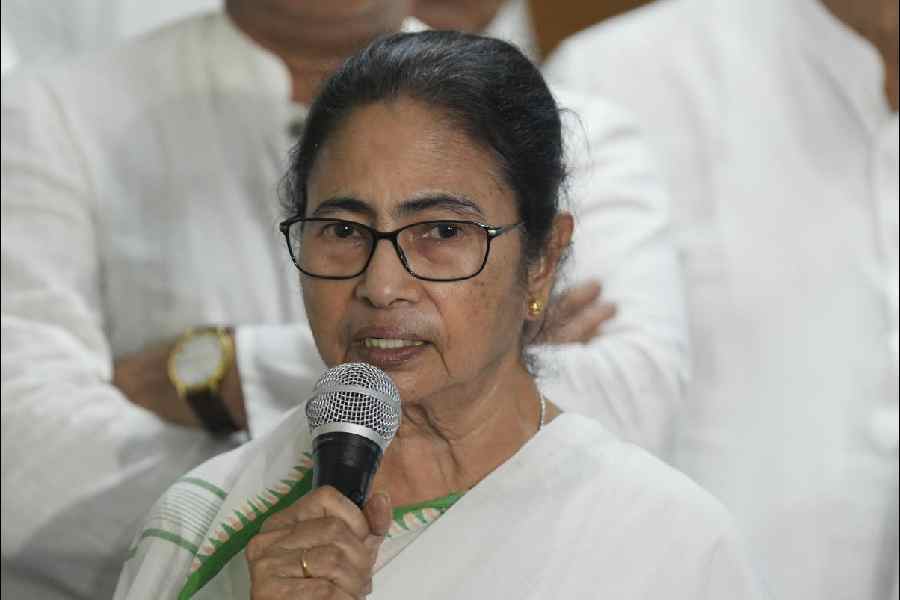Several senior doctors on Tuesday appealed to chief minister Mamata Banerjee to speak to the junior doctors, seven of whom are on a fast till death in Calcutta, and said the protests gave an opportunity to the government to fix gaps in the state’s healthcare system.
The government has met some of the demands but there are a few more that the junior doctors feel have not been met. The state government should step in and discuss a way forward, the senior doctors said at a news conference in an Esplanade hotel on Tuesday.
The protests are not only against the administration but also against some doctors who are corrupt, they said. The senior doctors who addressed the news conference included Asokananda Konar, Sujit Kar Purkayastha, Ajoy Sarkar, Anjan Lal Dutta and Sukumar Mukherjee.
They were pained to see the juniors on hunger strike and apprehended that the health of those on fast might start deteriorating soon, the doctors said.
“We are appealing to the chief minister and the state government to come forward and speak to the doctors and resolve this stalemate. This protest also gives the state government an opportunity to fix the many flaws and gaps in the healthcare system. If the government is able to fix the flaws, it will do a lot of good to the healthcare delivery system,” said Kar Purkayastha, a gastroenterologist and former managing director of Peerless Hospital.
“As someone involved in running a hospital, I have myself seen these gaps.”
Kar Purkayastha also stressed that the ongoing protests by the junior doctors were not just against the administration. “It is important to note that these protests are also against the doctors who are corrupt,” he said.
Konar, a gastroenterologist who has spent decades serving in government-run medical colleges, said they could not allow the hunger strike to continue. “This protest has now reached a state that we are all very disturbed. We cannot allow the junior doctors to continue this fast till death. Therefore, this appeal to the chief minister,” he said.
Physician Sukumar Mukherjee said both sides — the state government and the junior doctors — should reach an “amicable settlement”.
“There is a festival on one side and the fast on another. This is an appeal to the government to come forward and take measures to end this situation. Both sides should be doing some negotiation,” said Mukherjee.
The junior doctors, however, sounded unrelenting. “We are not here to negotiate. We want the government to accept all our 10 demands,” said Swarnaka Ghosh, a junior doctor at SSKM Hospital.
Debashis Halder, a senior resident at Medical College Kolkata and one of the popular faces of the two-month-old protests by junior doctors, said “there was no scope for any amicable settlement”.
“We have 10 demands and the government has to fulfil them,” said Halder.
Seven junior doctors are on a hunger strike at Esplanade. Six of them started the fast till death on Saturday evening, while one junior doctor joined them on Sunday night.
Two junior doctors started a fast till death at North Bengal Medical College and Hospital on Monday.
The junior doctors hadinitially been on a 42-day cease-work since the rape and murder of a postgraduate trainee doctor at RG Kar Medical College and Hospitalon August 9. They resumed work, but only partially, on September 21.
In 10 days, they were back to a complete cease-work. The second round of strike started on October 1.
The doctors announced withdrawal of the strike on Friday but started a fast unto death the next day to press for the 10 demands, which include students’ union elections, elections to form resident doctors’ associations and resignation of state health secretary Narayan Swaroop Nigam.
Ajoy Sarkar, a critical care expert, said at the press conference that he wanted the government to start talks with the junior doctors immediately. “Why are they (the government) waiting for the health of the junior doctors to deteriorate to the extent that they need to be taken to hospital? Why will they start talking then? The talks should start right now,” he said.










